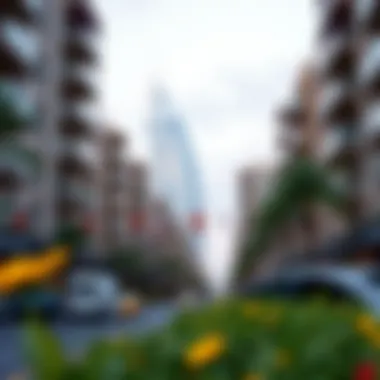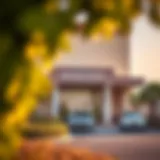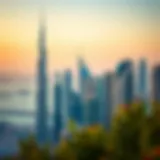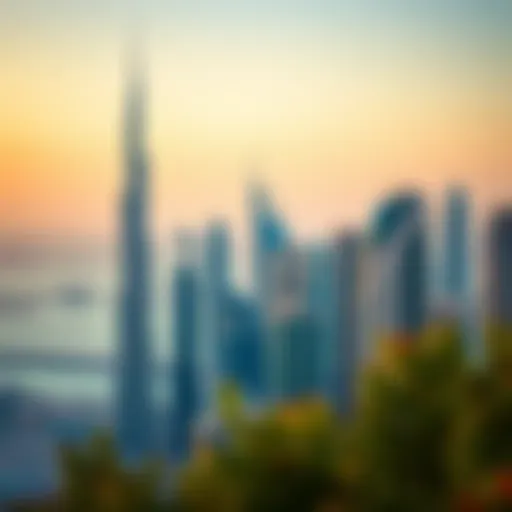Analyzing Home Prices in Dubai Real Estate Market


Market Trends and Analysis
Current Market Overview
Understanding the nuances of home prices in Dubai requires a keen eye on current market trends. Over the past few years, the property landscape in the city has experienced considerable fluctuations due to various influences. The demand for housing has risen sharply, particularly among expatriates and investors, driving prices to new heights. Data from a range of sources, including property analysts and market reports, indicate that the average cost of home ownership has surged. The allure of luxury developments and high-end amenities continues to attract buyers, making the market vibrant yet competitive.
The reports often show that prime locations like Downtown Dubai and Palm Jumeirah command premium prices. On the flip side, neighborhoods like Dubai Silicon Oasis and Jumeirah Village Circle offer more affordable options, catering to a different demographic. These regions provide potential buyers with a solid entry point into the market without breaking the bank.
Future Market Predictions
When looking ahead, several trends emerge in the home prices of Dubai. Experts predict a stabilization phase as the market begins to adjust to economic shifts. With global economic fluctuations often impacting local markets, buyers are advised to keep a careful watch on fiscal policies and interest rates.
"While the excitement in the market remains, it’s the undercurrents of economic factors that will dictate future pricing trends."
Moreover, as Dubai continues on its ambitious path towards sustainable development and innovation, new projects are likely to enhance the desirability of various neighborhoods further. The upcoming Expo 2020 event, even if postponed, is expected to bring long-term benefits to the real estate sector, translating into gradual increases in property values.
Investment Opportunities
Emerging Neighborhoods
As the pulse of the Dubai real estate market beats stronger every year, emerging neighborhoods present unique investment opportunities. Areas such as Dubai Hills Estate and Dubai South are gaining attention for their well-planned environments and connectivity. New developments and modern infrastructures in these locations provide compelling reasons for both homeowners and real estate investors to consider.
- Dubai Hills Estate: Offers luxury villas and townhouses amid lush greenery, catering to both families and individuals.
- Dubai South: Home to the Expo 2020 site, this area is forecasted to transform dramatically, appealing to investors looking for future returns.
Types of Properties for Investment
Investors in Dubai's real estate market can choose from a myriad of property types, each presenting distinct advantages. The main categories include:
- Luxury Villas: These properties appeal to high-net-worth individuals and offer spacious lifestyles.
- Condos and Apartments: Ideal for expatriates and young professionals, these units are abundant in key urban centers.
- Commercial Properties: With the burgeoning tech environment, investing in office spaces is increasingly rewarding.
- Vacation Homes: Short-term rental properties can capitalize on the tourism boom, providing solid returns during peak seasons.
Prologue to Dubai's Real Estate Market
The real estate market in Dubai stands out on the global stage. With its shimmering skyscrapers and opulent neighborhoods, it attracts attention from investors, homeowners, and expatriates alike. There's a unique charm in Dubai's blend of luxury modernity and rich cultural tapestry.
Understanding the dynamics at play here is crucial for potential buyers and investors. A myriad of factors shape home prices, from economic trends to local demand. Those diving into the market need to be well-equipped with knowledge, as decisions made here can lead to substantial financial implications.
Exploring this sector not only enhances awareness but also unveils the opportunities that await. For instance, comprehending how historical trends influence present market conditions can guide buyers in making informed choices. Overall, a comprehensive grasp of Dubai's real estate landscape is essential for navigating this competitive realm.
Historical Overview
Dubai’s real estate journey is like a rollercoaster ride, marked by rapid growth and significant downturns. The historical context sets the groundwork for understanding current price points. In the early 2000s, the emirate transformed itself from a trading post into a powerhouse of real estate development, planted firmly on the global map. Massive projects such as the Burj Khalifa and the Palm Jumeirah were catalysts in this transformation, bolstering not just local pride but also global interest. As foreign investment surged, prices soared, leading to a thriving market where luxury properties became the norm.
However, by 2008, the financial crisis sent shockwaves through the market, causing prices to plunge. It took several years for Dubai to recover, but Resilience has been a hallmark of the emirate. In recent years, strategic initiatives aimed at attracting investors have actively reshaped the market dynamics. This resurgence has been supported by infrastructure improvements and a diverse economic strategy.
Understanding this history provides insights into current pricing trends and allows potential buyers to see the ebb and flow of values over time, helping them gauge future movements in this vibrant market.
Current Market Landscape
Today, Dubai is a melting pot of diverse property types and price ranges. The market is characterized by its luxury segments, mid-range offerings, and more affordable housing options, catering to a wide spectrum of lifestyles and budgets. With a consistent influx of expatriates seeking residence, demand for housing has remained robust. Trends indicate that as the city gears up to host global events and continues to position itself as a tourism hotspot, the residential real estate market is likely to witness further growth.
However, buyers must tread carefully. While some areas showcase skyrocketing prices, others may provide better value depending on strategic planning and future developments in the region. Neighborhood preferences are influenced not only by market pricing but also by accessibility, amenities, safety, and overall neighborhood appeal.
The current landscape also presents complexities, such as varying property laws and regulations for foreign buyers. Hence, it’s important for anyone interested in entering this market to stay informed and seek professional advice when necessary.
"Real estate is an evolving puzzle. Understanding its components leads to smarter investments."
Factors Influencing Home Prices
When delving into the realm of Dubai’s real estate market, it becomes apparent that home prices do not rise or fall haphazardly. Various intricate factors weave into a broader tapestry that dictates pricing trends. Understanding these influences is paramount for prospective buyers and investors, afor they illuminate the potential paths that the market may take. From the state of the economy to local dynamics, a keen grasp of these elements offers a substantial edge in making enlightened decisions.
Economic Indicators
Inflation Rates
Inflation rates carry a significant weight in shaping the overall economic landscape, including home prices. In simple terms, when inflation hits, it often signals that the cost of goods and services is on an uptick. For homebuyers, this typically means that purchasing power is on a decline, leading them to shoot for properties that might be just out of reach financially. A key characteristic of inflation rates is their capacity to influence interest rates, which in turn affects mortgage costs. While a moderate inflation may appear beneficial — as it reflects a growing economy — high inflation can scare buyers away from dipping into the market.
One unique feature of inflation in Dubai is its fluctuating nature due to the region's dependency on oil prices, which can sway the economy significantly. The advantages of having a grip on inflation trends include the power to better anticipate price adjustments and plan investments accordingly, while the disadvantage lies in the unpredictability of sudden spikes in housing costs.
Employment Growth
The strength of job growth plays a crucial role in the real estate sector. A healthy job market attracts residents seeking to establish their roots in the bustling city. Consequently, when jobs are abundant, home demand rises, pushing prices north. Notably, employment growth in Dubai has been quite robust, especially in sectors like tourism and real estate. This job boom often translates into a key characteristic of higher purchasing power among potential buyers.
Viewing employment growth through a unique lens, it becomes clear that certain industries like technology and hospitality can serve as bellwethers for housing demand. The upside of job growth is clear: more wallets can lead to increased bids on properties. However, the flip side could reflect price surges that stretch budgets, especially for first-time buyers.


Foreign Investment
Given Dubai's allure as a global melting pot, foreign investment holds substantial sway in the local market. When international investors pour money into Dubai's real estate, they often lift home prices, creating a competitive environment for domestic buyers. The characteristic of foreign investment here isn’t just the capital influx, but also the prestige tied to international buyers who wish to own a piece of this iconic city.
A unique feature of foreign investment is the diversity it brings—different buyers have varying expectations and preferences, which can affect what types of properties may see a price hike. This trend can benefit the overall market, bringing vitality and innovation to property developments. However, for local buyers, the downsides could include the alienation from affordable options as the international crowd pushes demand higher.
Supply and Demand Dynamics
Construction Rates
A vital question lies in how the construction of new properties affects home prices. If new developments are on the rise, it can result in a balancing act against existing home prices. Higher construction rates can often suggest a healthy market where developers feel confident. However, if construction far outpaces demand, that surplus can lead to a depreciation in home prices. A telling characteristic of Dubai's construction rates is that they reflect both local investor sentiment and regulatory constraints that impact how quickly projects can get off the ground.
One unique advantage to keeping an eye on construction trends is grasping the potential for price equality across various neighborhoods. The downside, however, is the lag time—recently built properties might not sell immediately, creating a gap between demand and supply.
Population Growth
Dubai's magnetic pull attracts multitudes, resulting in steady population growth. More residents mean higher housing demand, and this directly affects prices. An essential characteristic of population growth in Dubai is its diversity, with expatriates often leading newcomers. These individuals generally have varying incomes and housing preferences, which can create distinct sectors within the real estate market.
With a unique upside, population growth fosters vibrant communities and supports businesses in the area. On the downside, an unchecked surge in population can lead to overcrowding, which might make home prices grow unsustainably high, pushing them almost out of reach for many potential buyers.
Market Saturation
Market saturation indicates that the number of available properties is starting to outshine the number of eager buyers. This factor can significantly determine home prices, as an oversupply usually leads to discounts on property listings, creating a buyer’s market. An intriguing characteristic of saturation in Dubai is how rapid recovery from it can occur post-economic shifts; the city is known for its ability to bounce back quickly.
Unique features of market saturation include various sectors responding differently—luxury markets may withstand pressure better than affordable segments, leading to differential pricing across classes. The upside of realizing market saturation is that it could signal an excellent opportunity for bargain hunters, but the downside includes prolonged downturns which may deter new developments.
Location and Neighborhood Appeal
Proximity to Amenities
In real estate, the saying
Average Home Prices in Different Areas
Understanding average home prices across various neighborhoods in Dubai is crucial for potential homeowners and investors. Knowledge of pricing trends helps guide decisions, allowing individuals to identify suitable living or investment opportunities. Every area in the emirate has its unique charm and implies different price ranges. Thus, it is essential to consider factors like location, demand, and amenities before making a purchase.
Luxury Market Overview
Palm Jumeirah
Palm Jumeirah, often synonymous with opulence, stands out not just for its stunning views and private beaches but also for its lifestyle offerings. This iconic palm-shaped island showcases luxury villas and high-end apartments that attract both local and international buyers. The allure of Palm Jumeirah lies in its exclusivity and the high-profile developments that punctuate its landscape.
One remarkable characteristic of this area is its beachfront access, which many homeowners prioritize. The demand here tends to keep home prices climbing, often exceeding expectations. However, the downside is the hefty price tag, which could push potential buyers to reconsider their budgets. Those who value unparalleled luxury often find that Palm Jumeirah fulfills their desires, but they should be prepared for steep costs associated with living there.
Downtown Dubai
Downtown Dubai is another premier destination known for landmarks like the Burj Khalifa and the Dubai Mall. This bustling area caters to residents who crave proximity to entertainment and culture. It’s particularly appealing to young professionals and expatriates who thrive in dynamic urban environments.
Downtown’s central location offers unmatched convenience, making it a hotspot. Yet, the flipside involves navigating one of the city’s most competitive markets. Home prices fluctuate significantly, yet they often reflect the high demand for urban lifestyle convergence, which can swiftly make prospective buyers think twice about their choices. Investing in this area typically promises good returns, but patience is key due to market fluctuations.
Dubai Marina
Rounding out the luxury market is Dubai Marina, celebrated for its vibrant waterfront lifestyle. It towers with high-rise buildings that house luxury apartments, overlooking the marina. Residents enjoy a blend of leisure and excitement, with cafes, restaurants, and retail options all within walking distance.
A unique feature of Dubai Marina is its yacht club, welcoming boating enthusiasts. While the area maintains a high demand for rental units, home prices can vary based on the exact location within the marina. On one hand, this variety can allow for some flexibility in budget choices, but on the other, standing out in a saturated market can be a challenge for sellers and landlords.
Mid-Range Housing Options
Jumeirah Village Circle
Jumeirah Village Circle (JVC) has carved a niche as a favorable spot for families and young professionals seeking more affordable housing options. Its community-centric design emphasizes parks and recreational areas, making it particularly appealing for those with children.
A key characteristic of JVC is its relative affordability compared to other parts of Dubai. This feature attracts buyers looking for quality residences without breaking the bank. However, potential downsides include ongoing construction in certain parts of the circle, which may affect the living experience temporarily, but the long-term gain generally validates the wait.
Arabian Ranches
Arabian Ranches is ideal for those who want a suburban lifestyle with luxurious touches. This area is noted for its spacious villas, lush landscapes, and family-oriented amenities. The serene environment sets it apart from the bustling city life, attracting buyers interested in a community that emphasizes comfort.
The unique feature of Arabian Ranches is its integration with nature, offering paths for walking and cycling amidst green spaces. However, being relatively far from the city center may be a downside for some potential buyers who prioritize quick access to urban amenities. Still, its appeal continues to resonate with families valuing community bonding and spacious living.
Discovery Gardens
Discovery Gardens stands as a prominent example of an affordable housing demographic. It offers a mix of low-rise buildings surrounded by gardens, making it visually appealing while also pocket-friendly. This area caters mainly to budget-conscious buyers and renters, providing them with good-sized units in a well-maintained environment.
Friendly atmosphere and thoughtful landscaping stand out as the hallmark of Discovery Gardens. Though it lacks the luxurious features of pricier areas, it compensates with its affordability and access to basic amenities. Potential buyers must consider that, while the price is attractive, the location might not suit everyone—especially those seeking vibrant nightlife or expansive commercial activities.


Affordable Housing Trends
Dubai South
Dubai South is emerging as a key player in the affordable housing sector, signaling the government's vision to diversify urban development. The area accommodates various housing types ranging from apartments to villas, catering to a wide demographic.
One significant aspect of Dubai South is its proximity to key transport links, including the Al Maktoum International Airport and Expo 2020 site. This makes it an attractive consideration for those looking for long-term investments, especially as infrastructure continues to develop. However, buyers must weigh the potential wait for fully realized amenities, as the area is still developing its identity in the broader Dubai landscape.
International City
International City provides affordable housing options while offering a multi-cultural living experience. Known for its unique architectural themes representing various countries, it attracts a diverse range of tenants and buyers.
The key characteristic of International City is its budget-friendly pricing, making it an attractive option for those new to Dubai or looking for basic accommodations. However, it may fall short in terms of upscale amenities or immediate access to commercial hubs. This trade-off is essential to consider when evaluating overall living satisfaction in the area.
Al Quoz
Al Quoz might not be the first name that springs to mind when thinking of residential areas, but it has slowly transitioned into a hotspot for artists and professionals in creative industries. Known for its warehouse conversions and artistic vibe, it provides a unique space for those looking for more than just a home.
Its unique feature extensively appeals to young professionals seeking affordable living spaces with character. However, living here might involve compromises regarding layout and space since many properties in Al Quoz are conversions. It presents an appealing option for those valuing artistry and community over conventional living standards.
Investment Opportunities in Dubai
Investing in Dubai's real estate market can be an exciting venture, especially given the city’s dynamic growth and transformative developments. This section explores the various opportunities available for potential investors, highlighting the different characteristics that define high-yield areas, long-term value appreciation, and the unique qualities of specific neighborhoods. Recognizing these factors can significantly impact investment decisions, providing insights that are critical to maximizing returns.
High-Yield Areas
Emerging Neighborhoods
Emerging neighborhoods in Dubai are often characterized by their rapid development and increasing demand, making them prime spots for investment. Areas like Dubai Silicon Oasis and Dubai Investment Park have been gaining traction amongst investors due to their affordability and potential for significant appreciation. These neighborhoods typically offer a mix of residential and commercial properties, paving the way for diverse investment portfolios.
One of the standout features of these emerging spots is their focus on amenities and infrastructure. For instance, new schools, hospitals, and shopping centers are sprouting up, enhancing the overall living experience and attractiveness of these areas. However, potential investors should remain cautious, as some areas may still be in the early stages of development, leading to risks such as unexpected delays in project completion or fluctuating demand.
Commercially Viable Locations
Commercially viable locations are crucial for investors looking to capitalize on the bustling economy of Dubai. Areas like Business Bay and Dubai Design District showcase this facet well. These neighborhoods are hubs of activity, attracting businesses and entrepreneurs alike. The mix of office spaces, retail outlets, and commercial properties can create lucrative opportunities for renters.
What sets these areas apart is their proximity to main transportation links and economic zones. For instance, being near the Dubai Metro or main highways can significantly boost foot traffic for commercial ventures. The downside? Higher initial costs of entry compared to less developed regions. Yet, for savvy investors, the risk-to-reward ratio often justifies the expense, as demand in these bustling locales remains strong.
Tourism Hotspots
Investing in tourism hotspots presents a unique opportunity due to Dubai’s status as a luxury tourism destination. Areas such as Downtown Dubai and the Dubai Marina are not only popular with tourists but are also sought after by short-term rental investors. The unique blend of attractions, from the iconic Burj Khalifa to vibrant nightlife, make these neighborhoods a magnet for visitors.
The key characteristic of these hotspots is their high occupancy rates for short-term rentals, which can yield impressive returns during peak tourist seasons. However, investors should be mindful of local regulations surrounding short-term rentals, as compliance is crucial to avoid hefty fines. The fluctuating nature of tourism can also mean varying returns on investment based on seasonal trends.
Long-Term Value Appreciation
Long-term value appreciation is a paramount consideration for any investor in Dubai's real estate market. The city's consistent economic growth, bolstered by foreign investment and tourism, means that property values tend to trend upwards over time. By targeting well-established neighborhoods alongside emerging areas, investors can strategically position themselves to benefit from rising prices.
Consider properties that are situated near upcoming infrastructural projects or that enjoy unique attributes, such as waterfront access or historical significance. Making informed decisions based on these elements can enhance the likelihood of sustaining property values, providing a buffer against market fluctuations.
Investing wisely in Dubai's real estate landscape requires a careful analysis of location dynamics and market trends. With diverse opportunities spanning from high-yield areas to long-term appreciation, investors can find strategies that suit their goals.
For further insights, resources like Wikipedia and Britannica provide comprehensive information about urban development and economic trends in Dubai.
Financing and Ownership Options
Navigating the waters of Dubai's real estate market can feel like deciphering a complex puzzle, where understanding financing and ownership options is a crucial piece. Acquisition of property is not just about finding the right location but also about how to pay for it and what ownership structure best fits your needs. Knowing your financing options and ownership alternatives can significantly impact your investment, guide your decision-making, and shape your overall experience in buying a home in Dubai.
Mortgage Availability
When it comes to securing a mortgage in Dubai, things can be a bit different compared to other places around the world. The UAE’s banking sector is relatively robust, offering a range of mortgage options, though foreign buyers may face unique challenges. Local banks and financial institutions provide competitive mortgage products, which often feature attractive interest rates and flexible repayment terms.
However, potential buyers should be aware of several factors when seeking a mortgage:
- Down Payment Requirements: Buyers are typically required to make a down payment that varies based on residency status. Expats may need to put down a larger percentage compared to UAE nationals.
- Loan-to-Value (LTV) Ratios: For expatriates, banks usually offer an LTV ratio up to 75%, meaning you can finance up to three-quarters of the property value. The specific ratio may depend on your creditworthiness and income stability.
- Documents Needed: To secure a mortgage, lenders usually require proof of income, a residency visa, and an Emirates ID. It’s best to keep your documentation in order, as it speeds up the process.
- Interest Rates: Interest rates can be either fixed or variable; understanding the differences here is crucial in planning your long-term strategy.
"Understanding your financing options is as critical as choosing the right property. A deece mortgage plan can save you a bundle in the long run."
Guidelines for Foreign Buyers
For foreign investors looking to dip their toes into Dubai's property market, there are specific guidelines and regulations to follow. These frameworks not only protect the buyer but also ensure a smoother transaction overall:
- Freehold and Leasehold Properties: Foreigners can buy property in designated freehold areas, allowing full ownership. In contrast, leasehold properties can limit ownership to a certain number of years, typically between 30 to 99 years.
- Title Deeds and Registration: After securing a purchase, foreign buyers must register their new property with the Dubai Land Department. This process includes obtaining a title deed, which is a crucial document for asserting ownership.
- The Role of Agents: Engaging a reputable real estate agent who understands the nuances of foreign ownership can be invaluable. Not only can they help you navigate the market, but they can also guide you through the paperwork and legal obligations.
- Legislation and Changes: Laws and regulations change; thus, it's wise to stay updated on any shifts in property laws that might affect foreign ownership. Following sources like gov.ae can be beneficial.
- Taxes and Fees: It’s essential to factor in various costs such as property registration fees and maintenance costs when budgeting for your new home. These can add up quickly and should not be overlooked.


In summary, understanding financing and ownership options is not merely an afterthought for prospective buyers in Dubai—it's a fundamental element that shapes the entire acquisition experience. By properly navigating the mortgage landscape and adhering to guidelines, foreign buyers can establish their foothold in this bustling real estate market.
Regulatory Framework and Legal Considerations
Understanding the regulatory framework governing real estate in Dubai is crucial for any investor or homeowner. It safeguards property ownership rights and defines how transactions occur. This section delves into ownership laws, the property registration process, and various taxes and fees that one must navigate.
Ownership Laws
The ownership laws in Dubai have considerably evolved over the years, driven by the emirate’s ambition to transform its real estate sector into a global hub. In essence, there are mainly two types of ownership: freehold and leasehold. Freehold ownership allows expatriates to buy property in designated areas, granting them full ownership rights. This aspect is pivotal because it opens doors for foreign investors, encouraging capital inflow into the market.
On the other hand, leasehold properties offer a more temporary arrangement—usually extending up to 99 years. While not as appealing as freehold, these lease agreements can still provide substantial returns, especially in prime areas where property values are on the rise. Understanding these laws helps buyers make informed decisions about their real estate investments.
Property Registration Process
Once a property is purchased, the next step is registration. This step is significant as it formalizes ownership. The process primarily involves submitting necessary documents to the Dubai Land Department, including a sales contract, identification, and any required approvals. It involves a fee which, while adequate, is often overshadowed by the benefits of securing one's investment.
Incorporating technology into this process makes it seamless, with online platforms allowing for easier submissions and tracking. Consequently, this digitization reflects a shift towards modernization in Dubai’s real estate sector. Ensuring proper registration not only protects the buyer’s interest but also adds legitimacy to the property transaction, which is invaluable in Dubai’s competitive market.
Taxes and Fees
Homebuyers should be aware of the various taxes and fees associated with property ownership, which can significantly affect the overall investment cost.
Transfer Fees
One of the most notable costs is the transfer fee, charged when a property changes ownership. Typically, this fee is 4% of the property value, making it an essential consideration for buyers. While the fee may seem steep, it acts as a safeguard, ensuring that all transactions are recorded and property titles remain secure. This process helps maintain transparency in the market, fostering trust among investors. For many, the transfer fee becomes a familiar aspect of the buying process, signifying that due diligence is being performed.
Maintenance Costs
Regular maintenance costs are another aspect that buyers need to factor into their budgets. These costs can vary widely depending on the location and type of the property. Typically, homeowners may face annual fees for upkeep, which can include landscaping, security, and communal amenity maintenance. Why is this important? Well, adequate upkeep not only preserves the property’s value but also enhances the living experience. In emerging neighborhoods, while these costs may be lower, they can increase with demand as the area develops. Buyers must be aware of these potential expenses to avoid surprises down the line.
In summary, navigating through the regulatory framework and understanding the legal landscape surrounding home ownership in Dubai is crucial for any potential buyer. The rules, processes, and fees create a structured environment for real estate transactions. Being informed allows individuals to approach the market with a clearer perspective and makes for a smoother experience when investing in Dubai’s dynamic property scene.
Future Outlook of Dubai's Real Estate Market
The future of Dubai's real estate market is a crucial topic, especially for investors and homeowners keen on capitalizing on the vibrant dynamics of this metropolis. Understanding the future trends can provide significant advantages, from strategic investment timing to recognizing which areas to focus on. As Dubai continues to evolve, factors like economic resilience and technological advancements will play pivotal roles in shaping the market landscape. Looking ahead, several distinct elements warrant attention to navigate this complex terrain.
Recovery from Economic Shifts
In recent times, Dubai has faced various economic fluctuations influenced by global events. However, the emirate has displayed a remarkable ability to rebound. Analysts predict that as global markets stabilize, Dubai's real estate sector will follow suit, gradually recovering from any downturns. This recovery is essential not only for maintaining property values but also for attracting new investments. Real estate stakeholders should keep a close eye on economic indicators like job creation and foreign investments as these will signal how swiftly the market regains momentum.
The ability to adapt and recover from economic fluctuations is indicative of a city's long-term investment potential.
Trends to Watch
Keeping an eye on emerging trends is vital for anyone involved in the Dubai real estate market. Two significant trends stand out: sustainability and technology.
Sustainability Focus
Sustainability in real estate is becoming a focal point as citizens grow more environmentally conscious. In Dubai, this trend is reflected in the development of green buildings and eco-friendly communities. The key characteristic of sustainability is its long-term viability, which not only meets current needs but also considers future generations. Following this path not only aligns with global directives toward climate responsibility, but it also caters to a growing demographic of buyers seeking such sustainable options. The unique feature of sustainability in this context lies in the potential for cost savings in utilities and maintenance over time. This appeal makes sustainable properties increasingly attractive, despite possible higher upfront costs.
Smart Home Technology
Smart home technology is transforming how Dubai's residents interact with their properties. Integration of IoT devices enhances convenience, security, and energy efficiency — key characteristics that resonate with modern homeowners. The appeal of smart homes lies in their ability to automate daily tasks and optimize energy consumption, making them both innovative and practical choices for investors. However, potential drawbacks include the need for continuous technological updates and concerns regarding privacy and cybersecurity. While the initial investment may be higher, users often find that the benefits outweigh the costs in the long run.
In summary, the future of Dubai's real estate market holds much promise, with significant recovery anticipated following economic shifts and notable trends advocating for sustainability and smart technology integration. Monitoring these elements will be essential for anyone looking to make informed decisions in a landscape that's as exciting as it is complex.
Understanding Home Ownership
Understanding home ownership in Dubai is a crucial aspect for potential buyers, investors, and even expatriates considering a long-term lease. The appeal of Dubai’s ever-evolving real estate market lies not just in the gleaming skyscrapers and luxurious villas, but also in the various ownership structures available and the costs linked to maintaining these properties. This section delves into these vital elements, helping readers grasp the benefits and considerations involved in home ownership.
Types of Ownership Structures
In Dubai, property ownership can be categorized primarily into freehold and leasehold structures. Freehold ownership allows buyers to possess the property outright, giving them the freedom to sell, lease, or even pass it on to heirs without many restrictions. This model has gained traction among investors, especially in prime locations like Palm Jumeirah and Downtown Dubai.
On the other hand, leasehold ownership is prevalent in areas where government entities manage land, allowing buyers to lease properties for a certain number of years, commonly up to 99. This is often seen in less developed areas of Dubai, where the long-term viability of property is uncertain. Understanding these distinctions is essential to making an informed decision in this vibrant market, as each structure presents unique advantages, risks, and legal considerations.
Costs Associated with Home Ownership
Owning a property comes with various costs, beyond just the initial purchase. Buyers must be prepared for ongoing upkeep expenses, and community fees that can impact their overall financial commitment.
Upkeep Expenses
Upkeep expenses are a substantial factor in maintaining the value and livability of a property. This encompasses regular repairs, maintenance services, and even the cost of utilities which can fluctuate depending on usage. One notorious detail is that homeowners should budget for unexpected repairs; failing to do so can lead to significant financial strain.
The principal characteristic of these expenses is their variability. For example, a leaky faucet may require immediate attention, while also keeping an eye on more significant systems like HVAC that could need replacing every few years. Homeowners often find themselves pleasantly surprised by routine landscaping and pest control services that can keep their home environment pleasant and retain property value over time.
Community Fees
Community fees are another important consideration for prospective homeowners in Dubai. These fees are paid to property management companies for the upkeep of shared amenities and spaces, such as pools, gyms, landscaping, and security services. Their amount can vary by community or building, with luxury developments often charging a premium due to better services or amenities.
These fees typically provide the grounds for collective maintenance, allowing property owners to share the responsibility for communal areas. However, one must stay vigilant. Such fees can increase without much notice, thus impacting overall living costs. That said, many homeowners find that the benefits—like improved security and community facilities—outweigh the costs.







